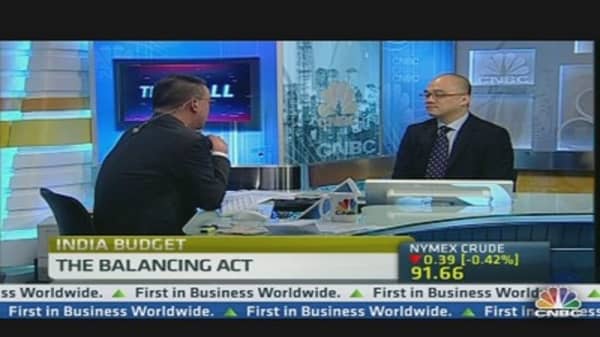Despite Finance Minister P Chidambaram's promise to put India's fiscal house in order in his latest budget plan, ratings agency Fitch said the country's credit rating – which is teetering on the brink of 'junk' status – will more than likely be downgraded, citing weakness in Asia's third largest economy's macro outlook.
"The reality is it [credit rating] is on negative outlook – so that bias suggests it's more than likely we will downgrade – that says it all," Art Woo, director, sovereign ratings at Fitch Ratings told CNBC Asia's " The Call " on Friday - a day after Chidambaram presented a pragmatic budget in which he announced a fiscal deficit target of 4.8 percent for the new fiscal year beginning April 1.
(Read More:
India Budget Increases Spending, Taxes the Rich
)
"If you look at the totality of measures that have been announced over the last six months, there have been some positive elements…but obviously the macro economic backdrop has weakened," he added.
Slowing growth, which came in at 4.5 percent in the December quarter, coupled with high inflation, hovering around 7 percent and a ballooning current account deficit, were some of Woo's concerns.
Fitch, which has assigned India a BBB- rating – the lowest investment grade rating - cut its outlook on the country to negative from stable in 2012. The ratings agency in January warned of a possible downgrade within the next 12-24 months, the Indian media had reported.
Since Chidambaram's return as finance minister in July 2012, the government has rolled out measures to both boost investment through opening up a range of sectors to foreign investors and bring government expenditure down by reducing subsidies on fuel.
(Read More: Will India's 'Do-No-Harm' Budget Cheer Investors? )
In his budget speech on Thursday, Chidambaram said the government would undershoot the fiscal deficit target of 5.3 percent for the current year ending March 31, plus he set a lower target of 4.8 percent of gross domestic product for the new year.
In Singapore about a month ago on a roadshow, Chidambaram told CNBC that if he were to come up with credible deficit numbers in the budget it could in fact force the ratings agencies to upgrade India's outlook.
(Read More: Indian Finance Minister Makes Case for Ratings Upgrade)
Woo, however, doubted whether the fiscal deficit target for 2013/2014 would be met arguing that the budget has a focus on revenue raising measures, such as raising taxes on the super-rich, rather than spending cuts, which he said would be a more certain way of reaching the goal.
"The emphasis on revenue-raising via tweaks to taxation rates, rather than cutting spending, illustrates the difficult balancing act that policymakers face between political imperatives and fiscal rebalancing as elections draw closer," he said.
India faces a national election next year, which has prompted the government to increase overall expenditure to 16.65 trillion ($309 billion) rupees in the coming fiscal year - from an estimated 14.3 trillion rupees in the current year.
S&P: Unaffected By Budget
Standard and Poor's (S&P), meantime, which also has a BBB- rating on India with a negative outlook, issued a statement on Thursday saying that the latest budget details will have "no impact on their rating."
The ratings agency said while India has presented a relatively prudent budget, despite being faced with a weak economic environment and political temptation, there are risks the government could exceed its budgeted expenditures ahead of next year's elections.
"Further developments in India's economic growth prospects, its external position, fiscal reforms including subsidies…and the political climate will determine the medium-term trajectory of the sovereign ratings on India," S&P wrote.




